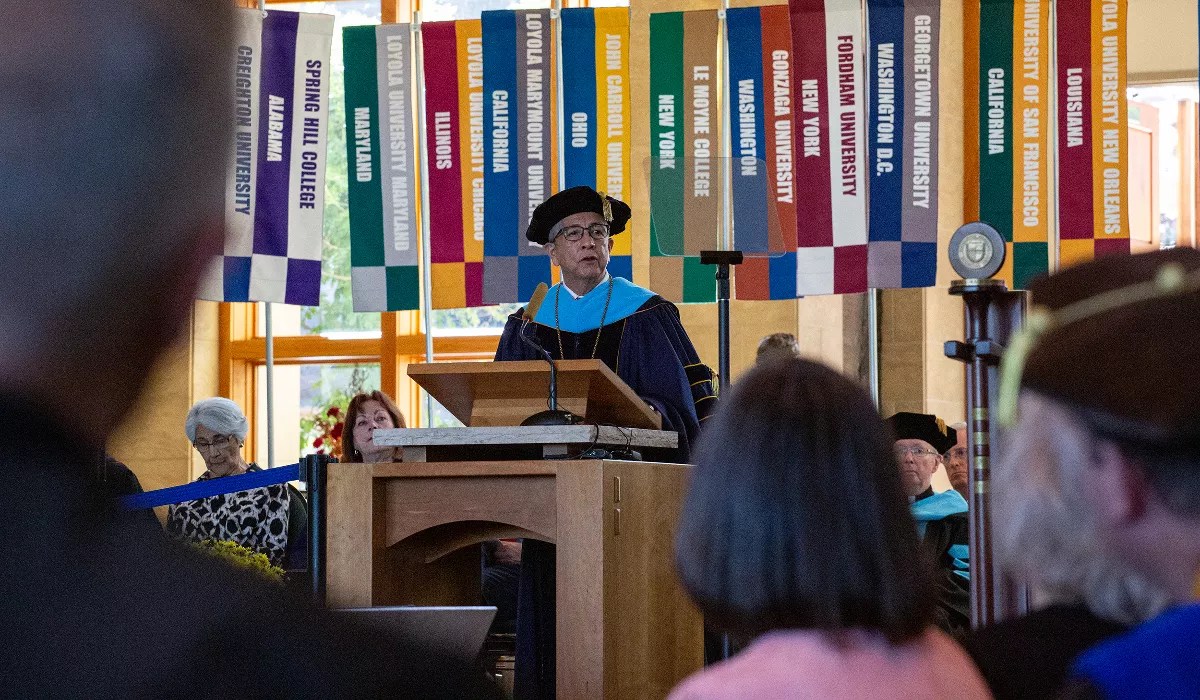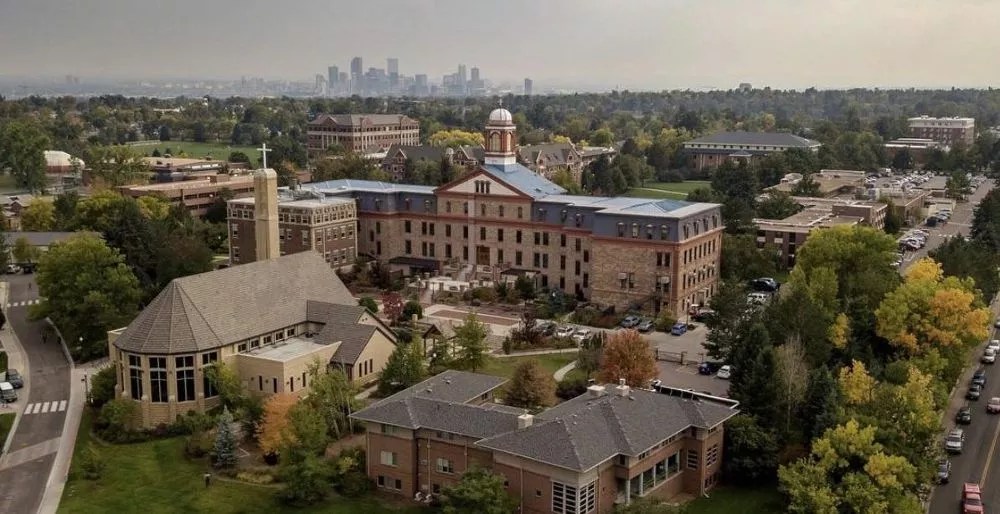
Courtesy of Regis University

Audio By Carbonatix
At Regis University, even the faculty members admit that the Jesuit school hasn’t always been known for its diversity.
“My dad is from Denver, and Regis wasn’t accessible for him,” says Nicki Gonzales, the vice provost for diversity and inclusion at Regis and a history professor. “For many Mexican-Americans – in particular, young men, because women weren’t admitted until 1970 – Regis was seen as out of touch.”
Regis University began in 1877 as Las Vegas College in New Mexico, Gonzales explains. The Jesuit priest who founded it had come to the United States to work with Spanish-speaking and Indigenous communities. “I always joke that it was founded as an HSI [Hispanic-Serving Institution] before the designation existed,” she says. “Our mission is to educate those on the margins.”
Now, Regis has something that no other university in Colorado has: an HSI designation – and a Latino president.
Earlier this year, the school appointed Salvador Aceves, the school’s chief financial officer for almost a decade, to the post before officially inaugurating him during a ceremony on Friday, September 22. His appointment came a couple months before Regis received its official designation as a Hispanic-Serving Institution in March.
To be an HSI, schools need to have a student body that’s at least 25 percent Hispanic among undergraduates who are enrolled full-time.
“We recognize that serving the community of the students of color was something that we wanted to make sure that we did,” Aceves tells Westword. “Over the course of the last couple of years, we’ve been very intentional at trying to prepare ourselves both to acknowledge the need, but also to then think about how we can serve this community better. Becoming an HSI was one of the initiatives that we felt we wanted to commit a lot of time and effort to.”
The designation ultimately entitles Regis to grants and government funding earmarked specifically for the approximately 600 schools – or about 10 percent of all colleges and universities in the country – that the U.S. Department of Education considers to be Hispanic-Serving Institutions. Faculty members appreciate the new status as more than just a path for more funding.
“It’s not pursuing funding for the sake of, but rather it has to be aligned with our own plans,” Aceves says. “First and foremost, it’s reaffirming that we now reflect the community we serve [and] support not only our Latinx students, but all of our students. It’s really about creating an inclusive, welcoming community of learners and scholars.”
Aceves has been looking to the relationship Regis has with Jesuit high schools across the state as key to keeping a significant Latino population on campus each year. Arrupe Jesuit high school in Berkeley – whose more than 400 students are over 90 percent Latino – is particularly important for Regis, he says.
“We continue to see a growing interest, particularly in our Hispanic community, partly because of important relationships we have with other Jesuit high schools,” Aceves explains. “Their pathway to the university was something we were very much aware of.”
Raul Dominguez, a professor, looks at the class he teaches on Mexican music and identity as an example of the school’s shift. “It’s the first time a class like this has been taught,” he says, noting how other classes focus on Mexican arts and culture. “For this kind of class to take place at Regis is super special. It also is a reflection on the university as a whole as we turn our gaze on this Hispanic-Serving Institution designation.”

Regis University is poised to serve more Latinos after it appointed its first Latino president and earned a designation as a Hispanic-serving institution this year.
Regis University
While Regis has been dealing with a steady decline in undergraduate enrollment over the past several years, the university has held on to a base of Latino undergraduates that has gradually become a bigger and bigger portion of its student body as time goes on – and more white students leave.
In 2022, Latinos made up 28 percent – or about 680 students – of the nearly 2,400 full-time undergraduates enrolled at Regis, according to the school’s records. White students accounted for half of the undergraduate population, with about 1,200 enrolled.
Despite the high numbers, Regis has actually had more Latino undergraduates enrolled in the past.
In 2017, the school had close to 800 Latino students. But with nearly 4,000 undergraduates enrolled that year, they only made up about 20 percent of the undergrad student body.
Overall enrollment at Regis has trended downward since then, decreasing by 38 percent since 2017. But Latino student enrollment hasn’t dropped nearly as quickly, having decreased by just 15 percent during that same time frame.
The number of White undergraduates, meanwhile, decreased by 42 percent.
According to Gonzales, the Latino numbers can be attributed to Regis building a foundation of Latino undergraduates in a “very organic” way. “We didn’t push this to happen,” she says. “Over time, we gained the trust of the Latine community. It’s the Catholic connection; it’s the values we share with the community.”
Aceves says that keeping “faith as an integral part” of the university’s mission has appealed to Latino families.
“When we recruit Hispanic students, we don’t just recruit the student,” he tells Westword. “We recruit the family.”
In Colorado, Latinos are the largest racial or ethnic group. The 1.3 million Latinos who live in the state account for nearly a quarter of its total population, which is more than 5.8 million people. Aceves says he feels “very good” about Regis reflecting those demographics more in its student body.
While more than a dozen schools in Colorado have the HSI designation, Regis can boast that it’s one of only four HSIs in the state that can also offer a bachelor’s degree. The other four-year colleges are Adams State University, Colorado State University Pueblo and Metropolitan State University of Denver.
Regis is also only one of two Jesuit universities in the country that has an HSI designation, alongside St. Peter’s University in New Jersey; only 27 Jesuit universities exist in the U.S.
Schools can wind up losing their HSI designation, which is what happened to the University of Colorado Denver in 2022. The school earned the title in 2021 but dipped back below the 25 percent threshold the following year.
The funding that Regis will receive as part of its HSI designation will not only help build on what it already offers Latino students, but it will also help the school welcome more students from the Latino community to keep the school’s prized HSI designation.
“Part of what we have to do is continue to develop and grow as an organization that is indeed inclusive and welcoming,” Aceves concludes. “The funding that exists is going to allow us to make those investments so we can continue to support our students.”